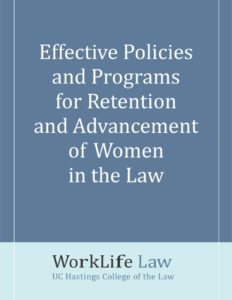Since the Center’s inception the legal profession has been a focus. The Center’s Project for Attorney Retention (PAR) Research Institute has studied and developed model part-time policies for law firms and in-house legal departments alike, which are designed to allow women and men to achieve workplace flexibility while still progressing in their careers. These policies have been implemented nationwide. The Institute expanded its study beyond issues of workplace flexibility to understand how compensation systems and performance evaluations affect women in the legal profession. Learn more about PAR’s history.
In recent years, the Center has expanded upon PAR’s work with cutting-edge reports on the development of the legal profession as well as original research on the workplace biases that exist in the legal profession.
Key Areas of Research
New Models of Legal Practice
 A market failure has existed in the legal profession for over two decades: many lawyers desire better work-life balance than is on offer either at law firms or in house, yet no organizations arose to fill that demand. Suddenly, in recent years, a wide variety of new models of legal practice have arisen that offer attorneys better work-life balance. These include:
A market failure has existed in the legal profession for over two decades: many lawyers desire better work-life balance than is on offer either at law firms or in house, yet no organizations arose to fill that demand. Suddenly, in recent years, a wide variety of new models of legal practice have arisen that offer attorneys better work-life balance. These include:
- Virtual law firms composed entirely to telecommuters who set their own schedules and annual hours;
- Organizations that place experienced in-house lawyers in corporations, either for short-term stints or for longer-term engagements lasting many months;
- Small firms, often composed of refugees from Big Law, that link better work-life balance for their attorneys with lower overhead for their clients.
With generous funding from LEXIS-NEXIS, Joan C. Williams, Aaron Platt, and Jessica Lee produced a comprehensive report on these new models of legal practice.
View Report
Interrupting Gender & Racial Bias in the Legal Profession
A new report from the Center for WorkLife Law, commissioned by the American Bar Association Commission on Women in the Profession and the Minority Corporate Counsel Association, examines implicit gender and racial bias in legal workplaces and offers new solutions and tools for interrupting bias across the legal profession. The study, titled “You Can’t Change What You Can’t See; Interrupting Gender and Racial Bias in the Legal Profession,” is based on the results of a nation-wide survey of lawyers that, for the first time, examined the subtle ways that bias plays out in everyday interactions in the legal profession.
The report describes the path-breaking findings captured in the survey and provides practical, easily-implementable tools that law firms and corporations alike can implement to interrupt and correct gender and racial bias in the legal profession.
Learn More

